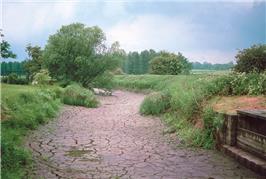Groundwater Resources and Climate Change
The causal links between climate change and increased greenhouse gas emissions are now well-established (see the article in Science Magazine by David King, the UK Government's Chief Scientific Advisor). However, major uncertainty still surrounds the detailed effects of climate change on the water cycle in the UK. It does seem likely that there will be greater variability in climatic conditions (UKCIP09 projections), with extremes - flooding and drought - becoming more common. There has been limited research on the impacts of climate change on groundwater - in the following pages, potential impacts are outlined.
Impacts on Groundwater of Climate Change
There are a number of models covering the UK which simulate the change in climate. The UK Climate Impact Programme (UKCIP), funded by the Department for the Environment Food and Rural Affairs (DEFRA) predicts that average temperatures in the UK will have increased by 1 to 5 °C by 2080 (click here for the DEFRA page on 'what climate change is'). The UKCIP model indicates winters may be generally wetter and summers substantially drier for the whole of the UK. The direct effect of climate change on groundwater resources depends upon the change in the volume and distribution of groundwater recharge. If drier, warmer summers lead to the seasonal deficits in the moisture content of soils extending into the autumn, the winter groundwater recharge season may be shortened. This could be compensated, at least to some extent, by an increase in winter rainfall. However, aquifers are recharged more effectively by prolonged steady rain, which continues into the spring, rather than short periods of intense rainfall.

Some predictions see overall groundwater recharge reducing by 5% to 15% UKWIR Report 03/CL/04/2 - Effect of Climate Change on River Flows and Groundwater Recharge UKCIP 02 Scenarios but there is a high level of uncertainty associated with these values. In the long term, groundwater recharge may reduce but the greater variability in rainfall could mean more frequent and prolonged periods of high or low water levels. The effects of climate change on groundwater in the UK therefore may include:
- a long term decline in groundwater storage
-
increased frequency and severity of groundwater droughts
-
increased frequency and severity of groundwater-related floods
-
mobilisation of pollutants due to seasonally high water tables
-
saline intrusion in coastal aquifers, due to sea level rise and resource reduction
These effects could mean locally-severe, groundwater-related impacts on water supplies, on property and on ecosystems that depend on groundwater. The impacts of climate change could increase the cost of providing water supplies, already rising as a result of deteriorating groundwater quality. Groundwater, of course, cannot be considered in isolation - impacts of climate change not necessarily related to groundwater, such as changing land use and population density, will have a knock-on affect on groundwater, for example through changes in water demand. (The potential complex interrelationship between factors is illustrated here by recent work on the impact of climate change on pesticides in the environment.)
However, overall, groundwater resources are likely to be relatively robust in the face of climate change compared with surface water, due to the buffering effect of groundwater storage. Groundwater, therefore, may have an important role to play in ameliorating the worst effects of climate change on the water environment, if managed appropriately.
As part of their Water Resources Plan submissions, all water companies in England and Wales are required to provide an assessment of the implications of climate change using Environment Agency guidelines. The guidance recommends water companies make use of predicted rainfall, river flows and groundwater recharge resulting from UKWIR research. It advises that groundwater models for examining the vulnerability of source yield to drought are used to indicate the likely impacts of climate change.
Although the increased variability in the climate that the UK is now experiencing is consistent with climate change models, the very significant uncertainties that exist about the future make it highly problematic to predict rainfall, river flows and groundwater response in the long term. The UK is moving into uncharted territory; the current understanding of groundwater flow mechanisms is insufficient to allow effective management of groundwater to cope with climatic extremes. More research is needed to be better able to predict the impacts of climate extremes. However, what is clear is that even with this, the country in future may have to adjust its environmental sustainability aspirations.
Climate Change Links
Some useful information sources for toolkits, reports and climate change scenarios include:

Print this Page